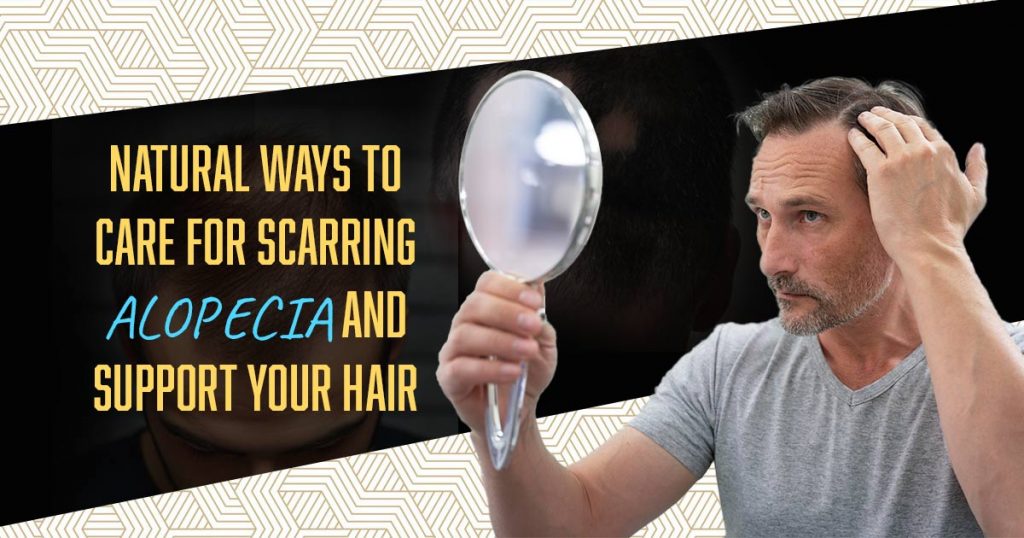Losing your hair can be tough, but when it’s due to something like scarring alopecia, it can feel downright overwhelming. Scarring alopecia happens when hair follicles get damaged by inflammation. Unlike other types of hair loss, this often results in permanent bald spots because the follicles are replaced with scar tissue. If you’re dealing with a condition like Central Centrifugal Cicatricial Alopecia (CCCA)—which is especially common in women of African descent—you’re not alone. The good news is, there are ways to manage it naturally and keep your scalp as healthy as possible.
While natural remedies might not reverse the damage, they can reduce inflammation, calm symptoms, and help protect the hair you still have. Here are some tips and tricks that might help!
Natural Ways to Care for Scarring Alopecia
1. Try Essential Oils for Your Scalp
Who doesn’t love the idea of a relaxing scalp massage? Essential oils like rosemary, tea tree, lavender, and cedarwood have been known to soothe scalps and improve blood flow. They’re also great if you’re dealing with uncomfortable symptoms like irritation or itching.
If you have CCCA, try blending a few drops of rosemary oil with coconut oil (or another carrier oil) and gently massage it into your scalp twice a week. This not only feels amazing but might slow down the inflammation targeting your hair follicles. It’s super easy to add to your routine and could make a real difference in your scalp health.
2. Upgrade Your Diet with Hair-Healthy Nutrients
What you eat can have a surprising impact on your hair. If you’re wondering how to treat scarring alopecia naturally, start with your plate. Hair loves nutrients like vitamin D, biotin, zinc, and omega-3 fatty acids, so loading up on foods rich in these is one way to support hair health from the inside out.
Salmon, eggs, spinach, sweet potatoes, and almonds are some superstar foods you should have on rotation. And if you think you might be missing key nutrients, it’s worth having a chat with your doctor about supplements. Just be careful not to overdo it—even the good stuff can be harmful if taken in excess!
3. DIY Hair Masks with Herbs
If you’re into natural remedies, you’ll love this. Herbs like amla and bhringaraj (popular in Ayurvedic remedies) are thought to promote healthy scalps. Using them in a hair mask is a simple and affordable way to treat yourself while giving your scalp a little TLC.
You can make your own mask by mixing powdered amla with warm coconut oil. Just apply it to your scalp, leave it on for about 30 minutes, and then wash it out. It’s an easy, natural way to calm inflammation and keep your scalp moisturized.
Can You Grow Hair on Scars?
Here’s the honest truth: once scarring happens, it’s not possible to regrow hair on those areas. But that doesn’t mean you should give up. You can still care for your scalp and surrounding follicles with treatments that soothe the skin and create a healthier environment.
Aloe vera gel is one of those magical natural remedies for alopecia hair loss. Its soothing effect can help reduce redness and inflammation while hydrating the scalp. You could also try ginseng extract, which is believed to support skin health. Use these remedies consistently, and even scarred areas might look and feel better over time.
Make Some Lifestyle Changes
Taking care of yourself as a whole can go a long way in managing scarring alopecia. Stress, for example, is a major trigger for inflammation. Incorporating stress-relieving habits into your routine can make a surprising difference.
Here are a few simple ideas:
- Practice yoga or meditation to calm your mind.
- Unwind after a long day with deep breathing or a relaxing bath.
- Stick to a sleep routine so your body gets the rest it needs to repair itself.
Even something as small as taking a calming walk outdoors can help you feel refreshed and take the edge off stress.
Take Care of Your Hair by Bringing It All Together
When you’re dealing with scarring alopecia, taking care of your hair starts with being kind to your scalp. Avoid products that are harsh or full of chemicals that can make irritation worse. Go for sulfate-free shampoos and conditioners, and skip the heat tools whenever you can. Oh, and be mindful of hairstyles! Tight ponytails or braids can pull on already damaged follicles and make inflammation worse.
At the same time, remember that natural remedies and lifestyle changes can help you manage the condition while supporting your overall wellness. Balancing a nutrient-packed diet with stress relief and gentle scalp care might not change the past, but it can make the road ahead smoother.
The beauty of a natural approach is it encourages you to take care of yourself holistically—not just your hair, but your mind and body, too. Start small. Try a scalp massage here, add some healthy foods to your meals there, and see how it feels. And as you go, don’t forget to reach out to a dermatologist if you need extra guidance. Sometimes, a little support goes a long way.
